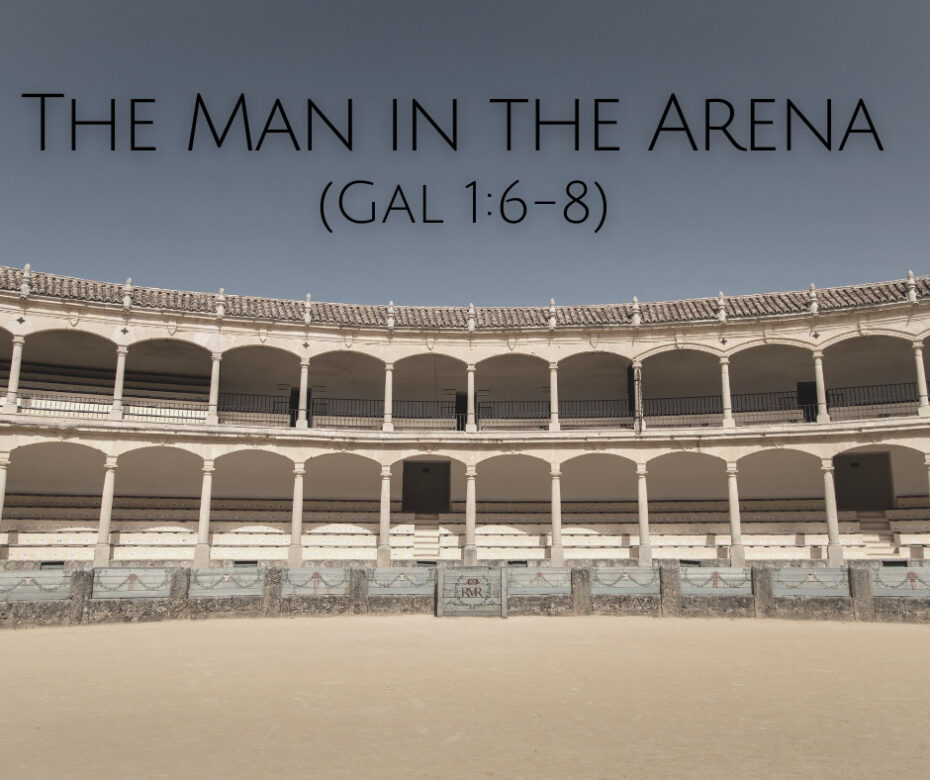Theodore Roosevelt was the twenty-sixth president of the United States. Shortly after leaving office, he gave a speech that became known as “The Man in the Arena.” One of the points of the speech is that the man who takes a stand is to be admired. Often times, people are critical of the man who does so. They are like spectators who watch a man fighting in an arena. They criticize him, commenting on how they would do things differently if they were in the thick of things. But they were not willing to take the stand that the man in the arena did. Speaking of these critics and the one they criticize, Roosevelt said:
It is not the critic who counts; not the man who points out how the strong man stumbles, or where the doer of deeds could have done them better. The credit belongs to the man who is actually in the arena, whose face is marred by dust and sweat and blood.
These are certainly inspirational words. In some ways, they apply to the theological arena. In Gal 1:6-8, Paul says there is only one gospel that can save a person from the lake of fire. But you would never think that was the case today. There are numerous gospels being proclaimed, even among conservative evangelicals. Some maintain that repentance is necessary to be saved. But there are various views of what repentance means. It might mean to feel sorry for sins. It might mean to actually stop sinning. Some preachers say it means the unsaved person must only be willing to stop sinning.
Many hold that the only requirement for receiving eternal salvation is faith, but once again, there are many different opinions about what faith involves. Some say it includes good works as evidence of saving faith. Others say true faith will endure in good works until the end of one’s life. Still others say that faith must include a commitment or a decision to obey Jesus in all He commands us to do. Many preachers say you must believe in Jesus for the forgiveness of sins, others that we must believe in His deity. It is common to hear people say we must only believe that He died on the cross and rose from the dead.
The same thing can be said about assurance of salvation. Some say we cannot be sure because eternal salvation can be lost. Others say we cannot be sure because we don’t know if we have been chosen by God for salvation before we were even born. Still others say we should not even ask the question about assurance because we cannot know for certain until the end of our lives.
If there are ten theologians in a room, there will probably be ten views about what saves a person and if that person can have assurance of that salvation. But there is a strange phenomenon about this situation. One would think, in light of Paul’s statement in Gal 1:6-8, that these theologians would contend with one another over whose message is correct. After all, they differ among themselves in the most fundamental message of Christianity.
But that is not the case. In the desire for unity, theologians often take the position that these differences are no big deal. It is maintained that all of these gospels are saving messages. All these theologians see themselves as being on the same team, even though they differ on the gospel itself.
But there is an exception to that sense of unity. I have known those who proclaim that there is only one gospel. They stand out because they say that there cannot be numerous messages that save. Unity is not to be gained at the expense of the truth. We must seek out that truth. The gospel that saves a person from the lake of fire is simply this: one must believe that Jesus is the One who gives eternal life as a free gift that can never be lost.
What sets this message apart is that it does not add works to the definition of faith. It does not require that one turn from his sins in order to be saved. It is a message that includes the assurance of salvation because works play no part in it whatsoever. It is a salvation that can never be lost.
Those who proclaim that message are like the man in the arena. Many are in the stands and listen to him. They criticize him. Even though the critics don’t agree with each other, they are united in their disdain for the one who stands in that arena apart from the crowd.
According to Roosevelt’s speech, it is the man in the arena who is to be admired. His critics are not. They simply play it safe. They are not willing to make a stand for what they say is the truth. They are united in their opposition to a man who is willing to do so. As they ridicule him, they do not seem to consider it strange that they do not agree with those around them who are also ridiculing the man, but for different reasons. If they do consider it strange, perhaps they simply think, “We don’t agree with each other on the most important aspect of our faith, but we sure ain’t as crazy as that guy.”
In this case, I happen to agree with the gladiator in the arena. There is only one message that saves. It is the message of grace. May we be willing to get in the arena and fight for that message, regardless of the critics in the stands.


